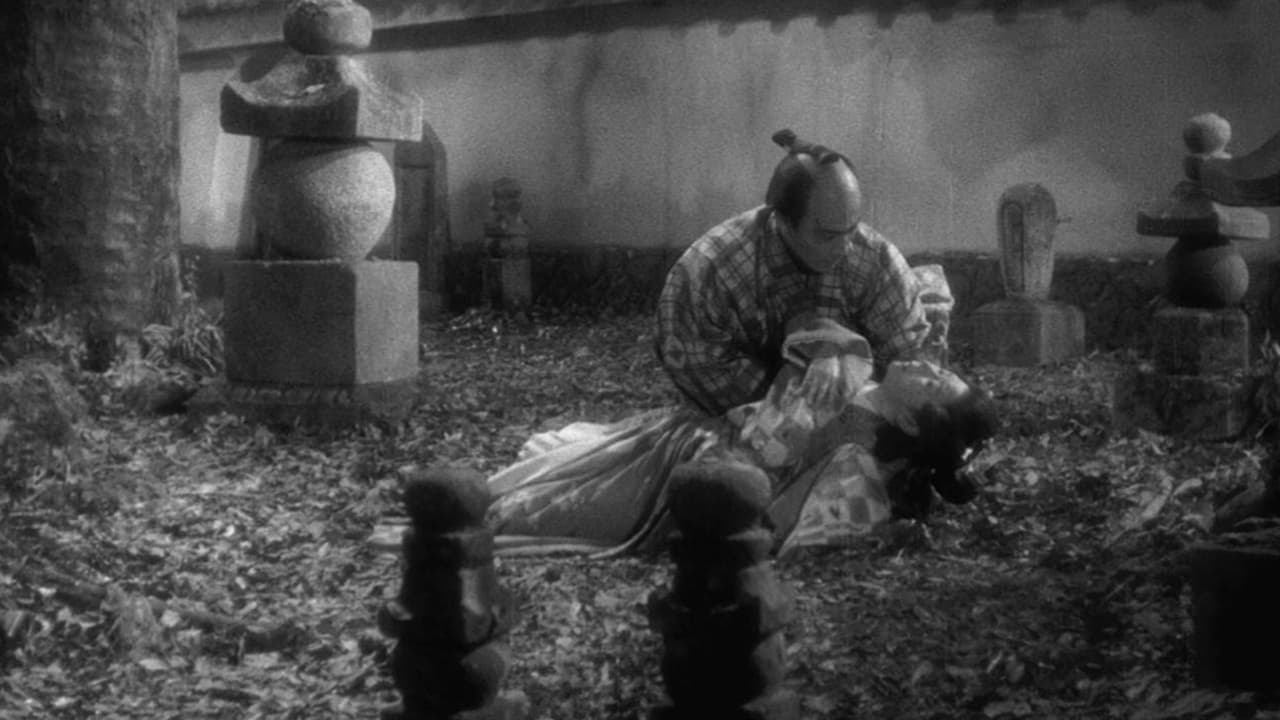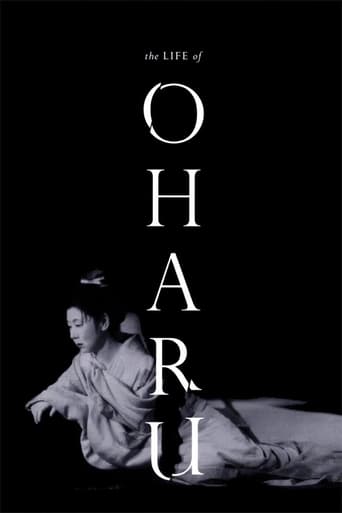

As this film opens, Oharu (Kinuyo Tanaka), a 50 year old prostitute, goes into a Buddhist temple and looks back at her life. We see that she was once loved, but because her young suitor (the great Toshiro Mifune) was of a lower caste, it was forbidden, resulting in her being banished and him being beheaded. As her family has been shamed, her father jumps on the chance to send her to a local Lord who is looking for a mistress who can be a surrogate mother. Unfortunately, she's abruptly dismissed after bearing him a son, and from there she steadily declines. The film was highly personal to director Kenji Mizoguchi since his own sister (who had raised him) was sold by their father to be a geisha, which is one of the things that happens to Oharu.Like 'Ugetsu', the film Mizoguchi made the following year, 'The Life of Oharu' is a morality tale, and while it's less heavy-handed than 'Ugetsu', it is fairly melodramatic. The central message is one of Buddhist compassion, and not just for those who we know have had a sad, unfair life – but also those who appear derelict or decrepit to us, and who we might otherwise judge, not knowing what they've experienced. While there is depth to that message, and it's certainly nice seeing a film that empathizes with woman and the misogyny they endure, 'The Life of Oharu' is dark and hard to watch for 148 minutes. The plot is quite linear and we see her used and abused in every single societal role she plays: daughter, lover, concubine, courtesan, wife, nun, and common prostitute. I also don't think Tanaka was well utilized in this role – she simply doesn't look young enough in early scenes, or old enough in later scenes. The filmmaking is good and the film has a solid place in film history for its message, but it's too bleak, and too simplistically so, for a film of this length.
... View More'Life of O Haru' is a very characteristic movie for Kenji Mizoguchi with its theme of forbidden love, its criticism of social conventions and its realistic and incisive description of the fate of women, the behavior of males and the effect of being sincere in a society, here a feudal one.In this feudal society, love (sexual intercourse) between a member of the nobility and a commoner is a transgression of the barrier between the social classes. When it is discovered, like in this movie, it is disastrous for the lover, the girl and her family. A real nightmare begins for the girl O Haru. Her beauty and sincerity are exploited to the bone, by brothel keepers, by those who need a male heir to ensure the continuation of the political and social power of a clan or by males (also a member of her family) in a position of 'strength '.The choice of the scenes, of which some are extremely painful, and the angles of the shots illustrate masterfully the balance of power in a society run by absolute power (the shogun), a world without feelings and mercy. As always with K. Mizoguchi, his direction of the actors is admirable; not one false note. This movie is a true masterpiece. A must see.
... View MoreMizoguchi's empathy for female characters is legendary. The Life of Oharu is one outstanding example. One woman's journey from member of the imperial court to elderly streetwalker is narrated in exquisite, shimmering, painful style. Oharu (Kinuyo Tanaka) is seduced by a man below her station. Her crime is to love the man back unreservedly. That action becomes the catalyst for a series of degradations punctuated by false dawns, as Oharu's life spirals to rock bottom. And as bleak and depressing as that sounds, Mizoguchi's storytelling, combined with Tanaka's dignified portrayal, make this film cathartic, a tragedy with a small, life-affirming message at its heart. It is a cautionary tale to the follies of social mores, and the burden that women through the ages have to endure. More than that, it is a tale of one woman's dignity through the most humiliating of circumstances. Stunning.
... View MoreJapanese cinema was virtually unknown in the West prior to Akira Kurosawa's victory at the 1951 Venice Film Festival with RASHOMON (1950); its success spurred fellow director Kenji Mizoguchi (whose career was basically in the doldrums at that stage) on to complete a dream project of his. Even so, due to the scarcity of sound stages after WWII, this film was shot in a large warehouse which was later also used by Josef von Sternberg for his own Japanese venture, ANATAHAN (1953). Consequently, THE LIFE OF OHARU (itself awarded the Silver Lion at the following year's edition of the Venice Film Festival) became Mizoguchi's own breakthrough effort – despite having already been in the business for thirty years! Actually, it turned out to be the first of five consecutive works of his to compete for this coveted prize.Having been personally involved with them, the trials and tribulations of geishas was a favorite theme of the director's and THE LIFE OF OHARU would seem to be its cinematic apogee'; in fact, eminent film critic Jonathan Rosenbaum went so far as to call it "the most powerful feminist protest ever recorded on film". It was also the twelfth collaboration between Mizoguchi and his leading lady Kinuyo Tanaka (who even turned to directing films herself the following year, the first Japanese woman to do so – to her mentor's apparent chagrin!). Conversely, the brief, almost unrecognizable appearance of Toshiro Mifune (albeit in a pivotal role) marked his only stint in a Mizoguchi film. While its very subject matter makes it perhaps less immediately appealing than the Japanese film-maker's subsequent masterpieces, THE LIFE OF OHARU still emerges as an exceptional work in his distinguished canon (in spite of its being cluelessly awarded a measly **1/2 rating in Leonard Maltin in his "Film & Video Guide"!).The film is long and episodic – everything that can possibly go wrong for Oharu does: the daughter of a samurai serving in the Imperial palace, she falls for a lower class page. He's beheaded for violating the social code when they're caught together, while Oharu and her family are exiled. A servant of a lord arrives looking for a concubine and settles on the heroine; after bearing the lord's son, his clan banish her for draining his energy! She's consequently forced into prostitution by her highly-indebted father, but is dismissed for being too proud before long. Next, she's hired by a wealthy merchant who takes advantage of Oharu upon learning of her past – an action which incurs the wrath of his jealous wife. A period of happiness married to a fan-maker is cut short when he's murdered by thieves, whereupon she decides to become a nun; however, Oharu's expelled once again when caught seducing a textile merchant to pay off her debts! Now reduced to street begging, she's taken in by two prostitutes – but is laughed at by her customers for being old and ugly. Oharu is then visited by her mother with the news that she's been invited back into her son's clan – but the elders veto the idea and, because of her 'shameful' behavior, is only allowed one glimpse of him! At the end of the picture, we see her resuming a beggar's existence Oharu's emotional turmoil is brought vividly to life by Tanaka's magnificent central performance – the actress herself was 42 at the time but, given Mizoguchi's penchant for medium shots, she manages to convincingly get away with portraying a woman from the age of 18 through to 50 – as well as an excellent music score by Ichiro Saito. Despite a generally downbeat tone, the film is relieved occasionally by humorous passages (such as the fastidious specifications required in choosing the lord's mistress and the ultra-servile attitude of the host at the brothel towards extravagant customers). The circular nature of the narrative is also evoked in visual terms: the film's very opening sequence is re-enacted towards the end; besides, the image of a cat stealing off with the wig of the merchant's wife is echoed by Oharu's imitation of a growling feline when confronted by the scorn of her customers.Having missed out on a rare Sunday morning screening on Italian TV (in the original language, no less), I'd long considered purchasing the film on VHS but had discarded this plan in view of the fact that the full-length version is supposedly 148 minutes (against the 137-minute print on the VHS). Still, I couldn't pass it by any longer when the R2 DVD also presented the shorter cut (even if I didn't have to buy it); hopefully, Criterion will sooner or later release their own edition to go with the other Mizoguchis – UGETSU (1953) and SANSHO THE BAILIFF(1954). Unfortunately, 30 minutes from the end, my DivX copy froze and wouldn't proceed any further – so I had to hastily convert it to DVD-R (a highly time-consuming process) in order to finish viewing the film!
... View More